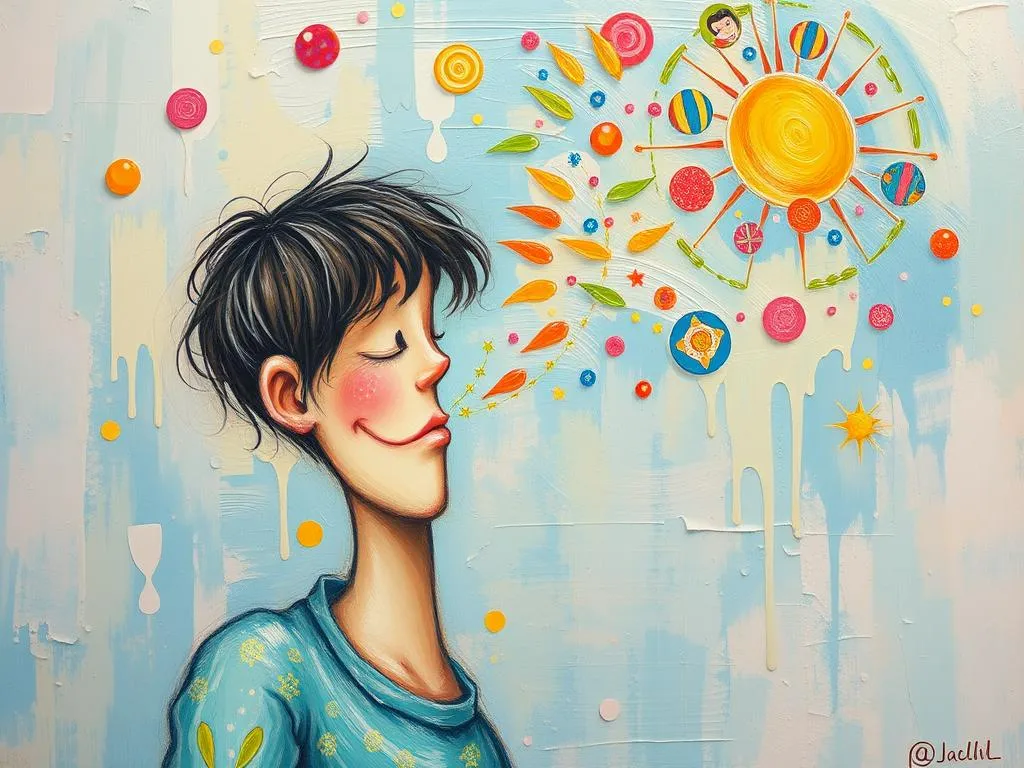
Dreams have long been a source of fascination and intrigue, often offering a window into our subconscious thoughts and feelings. Among the myriad of dream types, dreams involving our younger selves stand out due to their rich emotional content and profound symbolism. These dreams can evoke a range of feelings, from nostalgia to regret, and often prompt us to reflect on our past experiences, choices, and personal growth. This article delves into the symbolism and meaning behind these dreams, exploring their variations and the connections we can draw to our waking lives.
Symbolism and Meaning
Dreams of encountering a younger self can be laden with rich symbolism. Here are some common interpretations of symbols found in these dreams:
-
Childhood: This often signifies a time of innocence and simplicity. Dreaming of your younger self may indicate a longing for the carefree days of childhood or a desire to reconnect with your inner child.
-
Regrets: Seeing your younger self can also highlight feelings of regret or missed opportunities. It may symbolize unresolved issues from your past that are resurfacing for reflection.
-
Growth: These dreams can represent personal development. Interacting with your younger self may symbolize the lessons you’ve learned and how far you’ve come since those formative years.
-
Unfulfilled Dreams: A younger self in dreams may reflect dreams and aspirations that have been set aside or abandoned. It can serve as a reminder to revisit those ambitions.
-
Self-Compassion: Embracing your younger self in a dream can indicate a need for self-acceptance and compassion. It may be a call to nurture the child within and acknowledge your feelings and experiences.
Different perspectives can also influence the meaning of these dreams:
-
Psychological Perspective: From a psychological viewpoint, these dreams may represent an exploration of your identity. They can be a way to process childhood experiences and understand how they shape your current self.
-
Spiritual Perspective: Spiritually, dreams of the younger self may suggest a need for healing or reconciliation with one’s past. It can signify a journey toward wholeness and acceptance.
-
Cultural Perspective: Culturally, the significance of childhood and growth varies. In some cultures, dreams of the younger self may emphasize the importance of family ties and heritage.
Understanding these symbols can help you unravel the complex emotions tied to your younger self and guide you toward personal insights.
Key Scenarios and Variations
Dreams of encountering your younger self can manifest in various scenarios, each carrying its unique interpretation. Here are some common variations:
-
Playing with Your Younger Self: Engaging in playful activities with your younger self may symbolize a need to reconnect with your own joy and spontaneity. It suggests that you should embrace a more lighthearted approach to life.
-
Confronting Your Younger Self: If the dream involves a confrontation, it could indicate internal conflict. Perhaps you are grappling with decisions or behaviors that you wish you had approached differently in the past.
-
Advising Your Younger Self: Offering guidance to your younger self can represent self-reflection and the wisdom you’ve gained over the years. This scenario suggests a desire to heal old wounds and impart knowledge.
-
Witnessing Your Younger Self’s Struggles: Observing your younger self facing challenges can evoke feelings of empathy and compassion. It may reflect your understanding of past difficulties and a recognition of how they shaped your resilience.
-
Revisiting Significant Locations: Dreaming of returning to places from your childhood, such as your old home or school, can signify nostalgia or a desire to re-examine formative experiences. This scenario often highlights unresolved emotions tied to those settings.
-
Changing Outcomes: If you dream of altering a significant past event, it could symbolize a desire to reclaim power over your life narrative. This type of dream may suggest a longing for closure or healing.
Considering these variations allows for a deeper understanding of the underlying messages in your dreams. Reflecting on the emotions and scenarios present can lead to profound personal insights and growth.
Real-Life Connections and Takeaways
Connecting dreams of your younger self to your waking life can provide valuable insights into your current situation. Here are some practical steps for self-reflection and understanding:
-
Reflect on Your Past: Consider what aspects of your childhood are significant to you. Take time to journal about your memories, feelings, and experiences. What lessons have you learned, and how do they influence your present?
-
Identify Regrets: If your dream evokes feelings of regret, reflect on what you wish you could change. Acknowledge these feelings without judgment, and explore how they can inform your future decisions.
-
Revisit Dreams and Aspirations: Think about the dreams you had as a child. Are there any you’ve set aside? Use this dream as an opportunity to reignite those passions and consider how you can integrate them into your life today.
-
Practice Self-Compassion: Embrace your younger self with kindness. Acknowledge that every experience, good or bad, has contributed to who you are today. Engage in self-care practices that nurture your emotional well-being.
-
Seek Closure: If your dream involves unresolved issues, take steps toward closure. This might involve having difficult conversations, seeking forgiveness, or simply allowing yourself to grieve past experiences.
-
Embrace Playfulness: If your dream encourages playfulness, find ways to incorporate fun and spontaneity into your daily life. This might be as simple as engaging in a hobby you enjoyed as a child or spending time with loved ones in enjoyable activities.
-
Meditate on Your Younger Self: Visualization exercises can be powerful. Take time to meditate and visualize yourself as a child. What do you want to tell that version of yourself? What feelings arise during this process?
By actively engaging with the themes and emotions presented in your dreams, you can foster personal growth and build a more profound connection with your past.
Conclusion
Dreams of your younger self serve as a poignant reminder of the intricate relationship between our past and present selves. They encourage us to reflect on our personal journeys, embrace our experiences, and nurture the growth we have achieved over time. By understanding the symbolism and scenarios associated with these dreams, we can extract valuable insights for our waking lives and cultivate a deeper sense of self-awareness.
As you explore the meaning behind your younger self dreams, remember to approach them with an open heart and mind. Each dream is a unique narrative that can guide you toward healing, growth, and a richer understanding of who you are. Allow yourself the space to reflect, learn, and embrace your journey with compassion.







